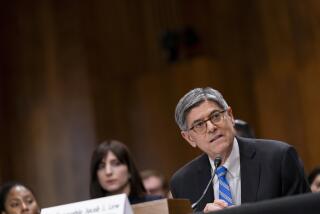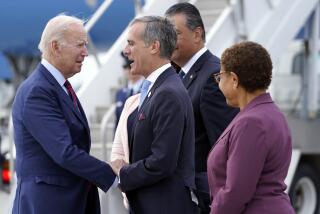Clinton Supports Somalia Envoy Despite Investigation : Ethics: Ex-Ambassador Oakley’s lobbying on behalf of Lebanese airline raised questions. White House says it did not know of probe earlier.
- Share via
WASHINGTON — President Clinton expressed “complete confidence” in Somalia envoy Robert B. Oakley on Wednesday, despite a State Department investigation of charges that the retired ambassador violated federal conflict of interest laws by lobbying as a private consultant for a Lebanese airline.
State Department spokesman David Johnson said that Inspector General Sherman Funk opened an investigation of Oakley last August after questions were raised about the propriety of Oakley’s effort to restore U.S. landing rights of Middle East Airlines, the Lebanese flag carrier.
The U.S. government severed commercial air service between the United States and Lebanon in 1985 because of terrorist attacks in Beirut and the rest of the country. MEA lost its right to serve the United States as part of that action.
As the State Department’s top counterterrorism official at the time, Oakley played an important role in the ban. The Ethics in Government Act prohibits any official who played a “substantial role” in a specific action from lobbying the government on behalf of a private client concerning the same issue.
According to a report first published by the New York Times, Oakley’s private consulting company and another firm signed contracts that could earn them as much as $600,000 if MEA is allowed to resume flights to the United States by next Jan. 1.
“On the question of Ambassador Oakley’s efforts on behalf of MEA, this matter was identified some time ago as an issue that needed to be reviewed,” Johnson said. “The department’s Office of the Inspector General began an investigation of the relevant issues . . . in August that is not yet complete. So further comment would be inappropriate.”
Oakley, who had been the civilian chief of the U.S. military operation in Somalia during the George Bush Administration, was called back by Clinton Oct. 7 to try to find a political solution to the crisis in the African nation.
White House Press Secretary Dee Dee Myers said Clinton did not know that Oakley was under investigation when he named him. But she said “the President has complete confidence in Ambassador Oakley.”
Oakley, back in the United States for consultations, talked about Somalia to a closed meeting of the House Foreign Affairs Committee Wednesday. He did not address the conflict-of-interest charges in public.
Terrorism is much less of a problem in Lebanon now than it was in 1985. All American hostages have been released and the level of random violence has fallen. However, the State Department continues to discourage visits to the country. U.S. passports are not valid for travel to Lebanon except in special circumstances.
“While all the known American hostages have been released, the organizations which abducted them continue to operate within that country,” the Department said in its most recent travel advisory issued Aug. 31.
Talking with U.S. business leaders Wednesday, Secretary of State Warren Christopher said that the Administration is not yet ready to end the travel restrictions, although he conceded that the measures damage U.S. business interests.
“Frankly, it is a security issue to us,” Christopher said.
More to Read
Get the L.A. Times Politics newsletter
Deeply reported insights into legislation, politics and policy from Sacramento, Washington and beyond. In your inbox twice per week.
You may occasionally receive promotional content from the Los Angeles Times.










